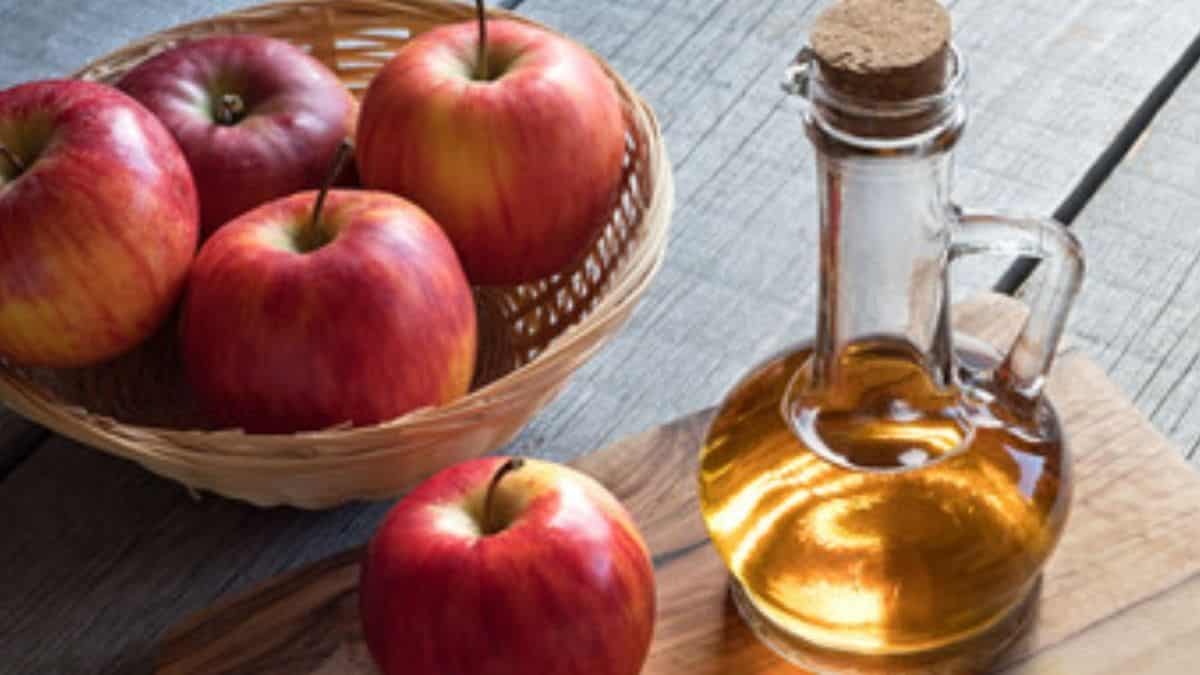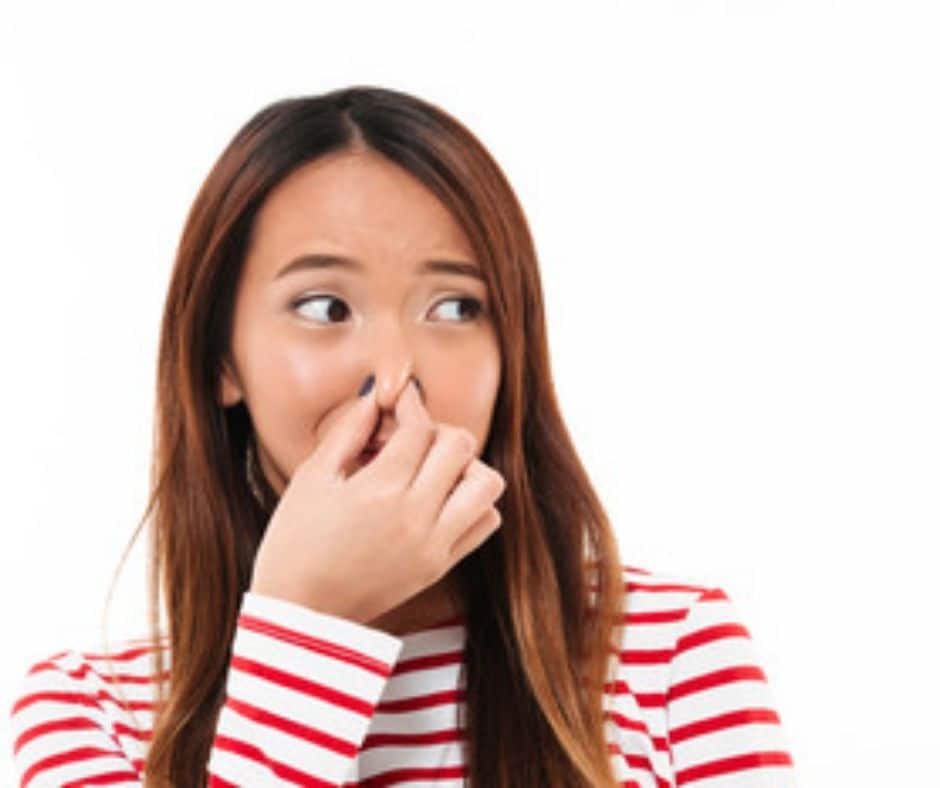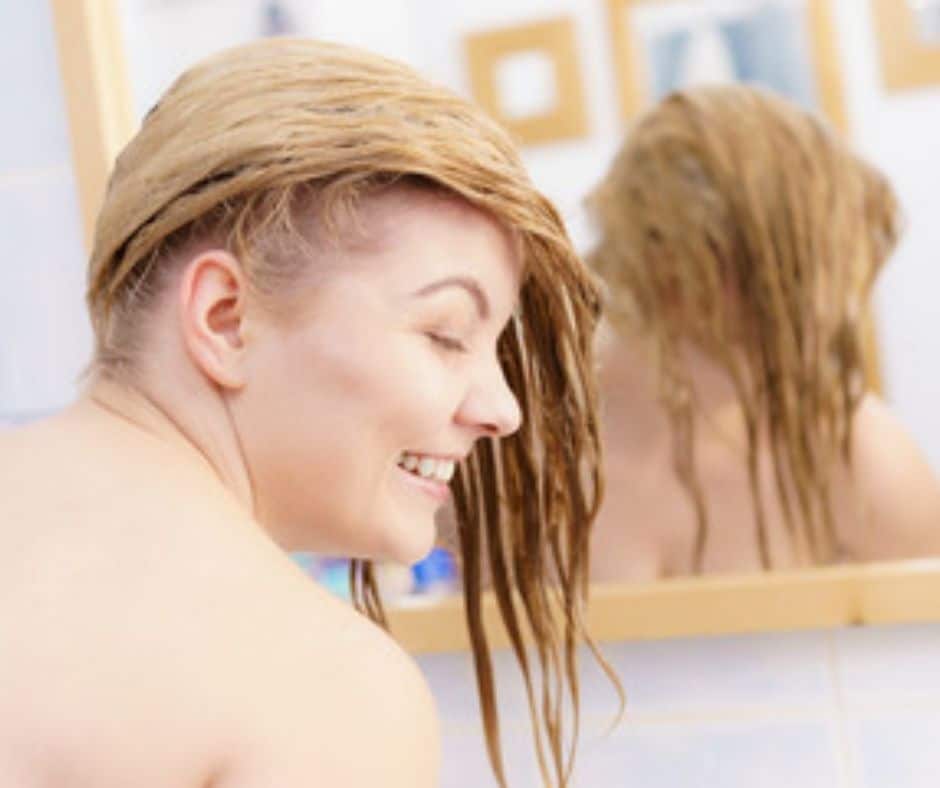How To Get Apple Cider Vinegar Smell Out Of Hair

Apple cider vinegar is known for its number of benefits. You can use apple cider vinegar at home for beauty treatments, cleaning, weight loss, etc. The smell of apple cider vinegar is not really pleasing. Here are some tips that would help you get rid of unpleasant smell.
The juice of crushed apples is used to make “apple cider vinegar” also known as ACV. The carbohydrates in this juice are transformed to alcohol after being extracted and subjected to bacteria and yeast. The alcohol is converted to apple cider vinegar when this is fermented again.
Antifungal, antibacterial, and antiviral activities have been discovered in apple cider vinegar. These qualities may aid in the treatment of hair problems such as dry hair. Home remedies, traditional medicine, and natural alternatives to commercial products are nothing new.
Since the beginning of time, people have found inexpensive ways to do things for themselves. Vinegar hair conditioners are valued for their ability to cut through built-up commercial products, make hair shine, and even remove odors like cigarette smoke or fried foods. However, a big problem with an apple cider vinegar hair conditioner is that it tends to leave behind its pungent smell. This brings us to asking why vinegar rinse works and why they leave behind that horrible smell?
This is because Store-bought vinegar is about 95% water and 5-ethyl acid, depending on concentration. This 5% acetic acid has all the benefits and smells. Unfortunately, this 5% is also responsible for the first-class institutions of this substance.

Acetic acid protects the hair from bacteria and maintains a balanced pH level. It is also believed to promote healthy hair growth by exfoliating the scalp for every hair type.
But despite the fact that acetic acid is present in a low concentration, the acidity of the acetic acid is so high (pH 2) that it needs to be diluted further if you do not want to leave a smell.
In this article, we answer some questions on; what neutralizes the smell of ACV, Why does my scalp smell like apple cider vinegar? Does ACV damage the hair and many more?
Firstly, let’s look at why apple cider vinegar hair rinse is needed, its benefits for the hair despite the smell, and how it works. Since prevention is better than cure, we will also give you some tips on how to avoid the pungent smell in the future.
Why a hair rinse with apple cider vinegar?

To balance the pH of your hair and scalp give you the confidence to pour apple cider vinegar over your head, here are the basics of how it works.
Your hair is actually a two-part structure made up of a follicle and a rod. Just below the skin’s surface are sebaceous glands, sebaceous glands, which secrete sebum through hair follicles. This oil lubricates hair and skin and is part of the acid mantle. Your acid coat is a very fine, slightly acidic thin layer that maintains and protects the overall health of your hair and skin.
Your acid coat has a huge impact on the look of your hair. The outer layer of the stem, also known as the cuticle, is compromised by overlapping scales. The acid coat plays a role in flattening cuticle scales, which makes hair shiny, smooth and protects against moisture loss, and is less prone to breakage. On the other hand, if applied in excessive amounts and levels, it might strip away some of the natural oils from the hair.
The vinegar elements will help to lower the pH of the hair, cause the cuticles to lie flat, and form a protective seal. As a result, it can make your hair smoother and simpler to untangle, as well as less frizzy, shinier, and more moisturized.
How is apple cider vinegar different from ordinary cider vinegar
ACV is a great alternative to store-bought hair conditioners. They both work by making your hair soft and shiny. However, they differ in the fact that store-bought ones contain harmful ingredients which could be damaging to your hair.
Apple cider vinegar is naturally rich in minerals, vitamins, and enzymes. All these nutrients are essential for healthy hair growth.
Can I leave apple cider vinegar on my scalp?
You can leave apple cider vinegar on your scalp if you want to treat dandruff, but remember to wash it off before bedtime.
If you’re looking for an easy hair care routine to keep your hair clean and smelling good, then apple cider vinegar is one of the best natural remedies out there. It’s cheap, effective, and safe for color-treated hair.
It doesn’t matter whether you have oily hair, dry hair, or curly hair, apple cider vinegar can still benefit you. If you’re looking for a quick fix for your hair, then apple cider vinegar should definitely be part of your routine.
Benefits of Apple Cider Vinegar for Hair
Apple cider vinegar has many positive benefits. When you dilute it properly and rinse it regularly, you will start to see some pretty big changes in the look and response of your hair.
- Beautiful, frizz-free hair: Apple cider vinegar is packed with nutrients that are great for creating luscious locks, including B vitamins, vitamin C and potassium. Being slightly acidic, it also serves to restore the natural pH of the acid mantle. Exposure to this acidity hardens the outer layer of the hair and flattens the cuticle, resulting in hair that shines, glides easily and is less likely to tangle or snag.
- Hair pH is restored: Hair has a pH of 4 to 5, which makes it mildly acidic. Hair’s natural pH must be maintained in order to prevent it from external damage and keep it healthy, silky, and lustrous. Most shampoos, on the other hand, have an alkaline pH. This could change the pH of the natural hair, causing cuticle damage and harming the hair fibers.
- Hair Follicle Growth May Be Boosted: Hair growth may be slowed by poor blood circulation to the hair follicles. Some people believe apple cider vinegar might help with blood circulation. Apple cider vinegar’s antimicrobial qualities may aid in cleansing the scalp and hair follicles. This could help you grow more hair.
- Removes Product Buildup: Apple cider vinegar also contains natural alpha hydroxy acids, which gently exfoliate the scalp and hair, allowing removal of dead skin cells and buildup that can occur from sweat and/or conventional hair products. It improves the appearance of the hair, reduces itching and allows for better styling.
- Restores Balance and Reduces Dandruff: For those suffering from scalp-related conditions like dandruff or itchy scalp, apple cider vinegar can relieve it thanks to its antiviral, antifungal and antibacterial properties. Apart from being antimicrobial, apple cider vinegar is also anti-inflammatory, which can fight the skin inflammation that usually occurs with dandruff and dry, flaky scalp.
- Boost/ improve the shine of your hair. Apple cider vinegar may aid in hair cuticle smoothing (the outermost protective layer of the hair). ACV’s acetic acid decreases frizz and restores hair pH, which alkaline shampoos may have affected. Its amino acids and fatty acids may help to make hair more lustrous.
Why does my hair smell like apple cider vinegar?
This is completely normal and is just a sign of product buildup on your scalp. By performing an acidic rinse, you will help restore the pH balance on your scalp and remove previous product build-up, aiding in a faster transition.
How to get apple cider vinegar smell out of hair
Apple cider vinegar naturally eliminates odors without using chemicals, so dilute it with equal parts water, add to a spray bottle, and spritz it around your living room for a fresh clean scent. Studies have shown that ACV kills bacteria, so it can improve your indoor air quality.
If your hair still smells after drying, you can try the following solutions:
- Washing thoroughly with shampoo
Buy any commercial shampoo and then wash your hair with it.
Rinse your hair with cool water, not warm water. Warm water is pleasant to the touch, but it can intensify the smell of vinegar. After washing off the shampoo, dry your hair completely. The scent can also be masked with fragrant oil or hair cream. In most cases, this will help remove the vinegar smell from your hair permanently.
- Scalp massage with baking soda
If the above shampoo solution is not working or the time is running out, you can massage your hair with baking soda to remove the unpleasant odor.
Baking soda naturally neutralizes the acetic acid in vinegar. As a result, applying it to your hair will help remove any residual smell.
Steps
- Take half a cup of baking soda and massage it into your scalp.
- Massage thoroughly with fingertips all the way to the ends of the hair.
- Leave for 15 minutes after application.
- Then remove the baking soda from your hair.
- Finally, rinse your hair with cold water and let it dry. That should help you get rid of the smell.
- Vinegar Hair Masking
If nothing else works and you’ve tried everything, mask the vinegar smell with a stronger but pleasant scent. The first thing that comes to mind is hair oils or creams. They are, without a doubt, the most straightforward option. If you prefer a more natural solution, a lemon juice rinse is a good option.
The smell of vinegar will be completely masked by rinsing your hair with lemon juice. Along with the vinegar, the lemon’s scent will fade.
What neutralizes the smell of vinegar
We’ve looked at some great solutions to the vinegar hair odor problem, but this shouldn’t stop you from rinsing your hair again. There are a couple of things you can do to avoid the awful smell:
- Vinegar should be diluted.
The solution should be diluted. Furthermore water should be added to the solution. If your hair still smells like vinegar after washing and drying, the vinegar-to-water ratio was probably too high. Five parts water to one part vinegar is the perfect ratio. Rather than pouring the solution straight over your head, use a spray bottle to evenly spray your scalp and then spread it with your fingers until it reaches the roots.
- Use Aromatic Herbs
Another option is to include some potent but pleasant-smelling herbs in your vinegar and water mixture. You may hide the smell of the vinegar to some extent by adding lavender or rosemary, leaving a nice scent on your hair.
Using Lavender or Lemongrass in a Blend should be done four weeks ahead of time, before rinsing your hair with vinegar. Fill a 1-quart glass jar halfway with lavender or lemongrass, then top it off with white vinegar.
Store this combination in a cold, dark location for four weeks, shaking the jar every day.
Rinse your hair at the conclusion of the four weeks. The scent of lavender or lemongrass will disguise the vinegar’s odor.
- Before using the Vinegar Solution, add essential oils to it.
After you’ve diluted the solution, add a few drops of scented essential oil before spraying it on your hair. This, like the prior method, helps to hide the vinegar scent. But the difference is that it won’t take four weeks to complete and can be completed right before you rinse your hair.
- Spritz with lemon juice ( Adding a Squeezed Lemon to Your Vinegar Solution).
If you don’t have any essential oils on hand, this is another quick remedy. Squeeze the juice of a fresh lemon into your vinegar solution. Lemon peels can also be added to the solution. When you spritz the solution, the lemon’s scent will totally mask the vinegar’s odour. You don’t need to be concerned because the vinegar will still perform its function.
Following the rinse, your hair will have a pleasant lemony scent. The fragrance will lessen as it dries, allowing you to avoid the vinegar smell entirely.
Procedure on how to get Vinegar odor off your hair
- Wrap your hair in a towel immediately after rinsing with vinegar.
- Unwrap your hair when the towel has soaked up the excess water, then let your hair dry completely without using a hairdryer. This is usually enough to make the vinegar smell fade.
- Wash your hair thoroughly with a commercial shampoo. Rinse with cold water rather than hot water, as heat intensifies most of the aroma.
- Condition your hair and rinse until clean but still coated. This will mask the vinegar smell if it doesn’t get rid of it completely.
- Dry your hair completely using a hairdryer set to medium heat.
Note:
Frequent rinsing of hair with vinegar can dry out the ends. Moisturize the ends with a few drops of hair oil after each treatment to prevent split ends or breakage.
What Is The Best Apple Cider Vinegar To Use?
Having known the benefits and how to reduce or prevent the smell of Apple cider vinegar, it is also the best product to use so as to generate maximum results.
- If you’re only using ACV as a rinse, it doesn’t matter whether it’s filtered or not, unfiltered ACV is preferable because it has more nutrients.
- The “Mother” (or “Mothers”): The fermenting process produces the ‘mother.’ Brown cobweb particles float at the bottom of the container. It may appear to have gone bad, yet it is actually beneficial.
- Unpasteurized ACV: You can buy ACV that hasn’t been heated. ACV that has not been pasteurized preserves the majority of its beneficial microorganisms.
- Organic apple cider vinegar is the best option. Look for ‘raw’ apple cider vinegar, which is free of artificial flavors and additives.
Can vinegar damage your hair?
There doesn’t appear to be any reason not to give it a shot. Using vinegar on your head, on the other hand, can be dangerous if you have certain health concerns or even if you have a certain type of hair. Below are some reactions and damages Apple cider vinegar cause;
- Reaction to allergens
An allergic response is one of the risks of using vinegar on your hair. Although vinegar is not one of the eight primary allergens that cause the majority of allergic reactions, your body can acquire an allergy to anything. If you’ve ever had an adverse response to vinegar-containing foods, don’t use it on your hair. Even if you haven’t had a reaction to vinegar before, you can acquire an allergy to it at any time.
- Reactions to Sulfite
Another risk of using vinegar on your hair is a sulfite reaction. Sulfites are chemical compounds that exist naturally in vinegar and other sour foods. Sulfites are also added to food by manufacturers to increase shelf life. If you have asthma and are on steroid medicine, or if you have a high level of respiratory sensitivity, the sulfites in vinegar may cause an allergic reaction.
- Irritation of the Scalp
Applying vinegar to your hair can cause skin irritation, particularly on the scalp. The surface of the human head is densely packed with blood vessels and nerves, and scalp skin is notoriously sensitive. Though this may not be a problem if your skin is healthy and intact, the acid in the vinegar will cause agony if you have acne or any wounds or scratches on your head.
- Hair damage
Using vinegar on your hair is hair damage. Because vinegar is a drying agent. If your hair is naturally dry, has been colored, or is brittle, vinegar may dry it out and increase the likelihood of breaking. A vinegar rinse may also cause damage to thin, fine hair. If you must use one, dilute the vinegar and rinse it immediately.
Conclusion
The benefits of rinsing your hair with vinegar are numerous as keeping scalp healthy. Unfortunately, it might also leave an unpleasant odor behind. Most of the time, diluting the solution with five parts water to one part vinegar would be enough.
After rinsing your hair, wait for it to dry before blow drying it again. There are additional options, like using shampoo or massaging your scalp with baking soda if that doesn’t help.
The most effective and long-term remedy to this issue is to avoid it entirely. This can be accomplished by disguising the vinegar solution’s smell before rinsing your hair.
ACV may be used to cure dandruff, eliminate scalp buildup, and restore the correct pH of the scalp and hair. Excessive use, on the other hand, may result in negative side effects. If you notice any reactions, consult your doctor.
